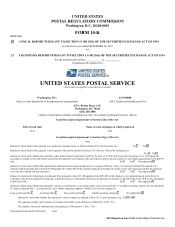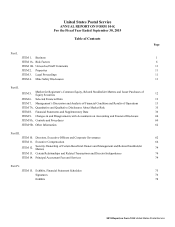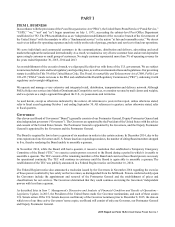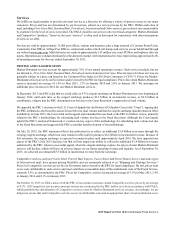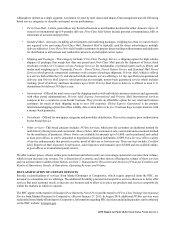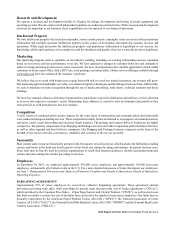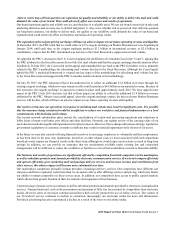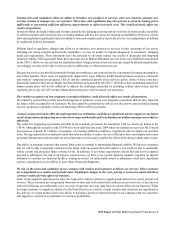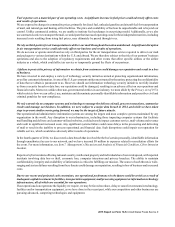US Postal Service 2015 Annual Report Download - page 11
Download and view the complete annual report
Please find page 11 of the 2015 US Postal Service annual report below. You can navigate through the pages in the report by either clicking on the pages listed below, or by using the keyword search tool below to find specific information within the annual report.2015 Report on Form 10-K United States Postal Service 9
Fuel expenses are a material part of our operating costs. A significant increase in fuel prices could adversely affect costs
and results of operations.
We are exposed to changes in commodity prices, primarily for diesel fuel, unleaded gasoline and aircraft fuel for transportation
of mail, and natural gas and heating oil for facilities. The price and availability of fuel can be unpredictable and is beyond our
control. Unlike commercial entities, we are unable to institute fuel surcharges in our pricing model. Additionally, as we also
use contracted carriers to transport the mail, we anticipate that increased operating costs for these independent carriers, including
increased costs resulting from rising fuel prices, may ultimately be passed through to us.
We rely on third-parties for air transportation to deliver our mail throughout the nation and abroad. A significant disruption
in air transportation service could adversely affect our business and results of operations.
We do not own or operate aircraft and we rely on third-parties for the air transportation service required to deliver our mail
and packages to various destinations within the U.S. and abroad. We are therefore subject to the risk of our partners’ business
operations and also to the adoption of regulatory requirements and other events that affect specific airlines or the airline
industry as a whole, which could affect air service or temporarily ground the fleets of our partners.
A failure to protect the privacy of information we obtain from customers could damage our reputation and result in a loss
of business.
We have invested in and employ a variety of technology security initiatives aimed at protecting organizational information,
as well as customer information. As one of the U.S. government entities most trusted by the nation, protecting the confidentiality
of data that we obtain is paramount to us. However, should our information technology security initiatives not fully insulate
us from a security breach or data loss, our reputation could be damaged, resulting in an adverse effect on our operations and
financial results. Moreover, unlike other non-governmental entities in our industry, we must abide by the Privacy Act of 1974,
which restricts how we can collect, use, maintain and disseminate personally-identifiable information and prescribes civil and
criminal penalties for non-compliance.
We rely extensively on computer systems and technology to manage the delivery of mail, process transactions, summarize
results and manage our business. In addition, we were subject to a major data breach in 2014, and while we have taken
steps to prevent similar events going forward, we may be the target of future attacks.
Our operational and administrative information systems are among the largest and most complex systems maintained by any
organization in the world. Any disruption to our infrastructure, including those impacting computer systems that facilitate
mail handling and delivery and customer-utilized websites, could adversely impact customer service, mail volume and revenue
and result in significant increased costs. Any significant systems failure could cause delays in the processing and delivering
of mail or result in the inability to process operational and financial data. Such disruptions could impair our reputation for
reliable service, which would also adversely affect results of operations.
In the fourth quarter of 2014, we discovered a data breach that involved the theft of certain personally-identifiable information
through unauthorized access to our network, and we have incurred $9 million in expenses related to remediation efforts for
the event. For more information, see Item 7. Management’s Discussion and Analysis of Financial Condition, Cyber Intrusion
Incident.
Reports of cyber incidents affecting national security, intellectual property and individuals have been widespread, with reported
incidents involving data loss or theft, economic loss, computer intrusions and privacy breaches. The ability to maintain
confidentiality, integrity and availability of information is critical to fulfilling our mission. The source of such threats is wide-
ranging and system failures resulting from these threats could damage our reputation, resulting in loss of business and increased
costs.
Due to our recent and projected cash constraints, our operational performance in the future could be at risk as a result of
inadequate capital investment in facilities, transportation equipment, mail processing equipment or information technology
infrastructure, all of which are essential for our operations.
If our operations do not generate the liquidity we require, we may be forced to reduce, delay or cancel investments in technology,
facilities and/or transportation equipment, as we have done in the recent past, while our competitors and other businesses are
pursuing advanced, competing technologies and equipment.

